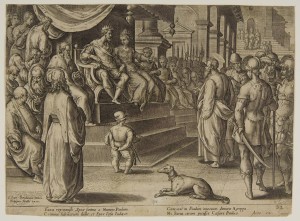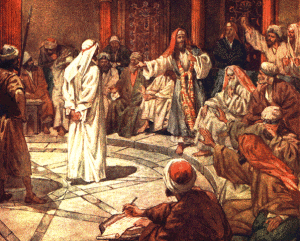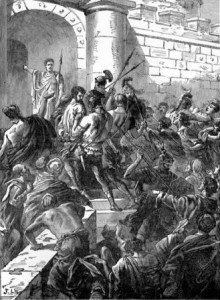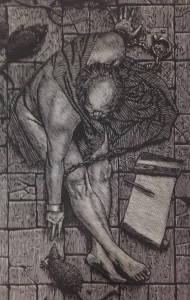 Acts 27
Acts 27
1 And when it was decided that we should sail for Italy, they delivered Paul and some other prisoners to a centurion of the Augustan Cohort named Julius. 2 And embarking in a ship of Adramyttium, which was about to sail to the ports along the coast of Asia, we put to sea, accompanied by Aristarchus, a Macedonian from Thessalonica. 3 The next day we put in at Sidon. And Julius treated Paul kindly and gave him leave to go to his friends and be cared for. 4 And putting out to sea from there we sailed under the lee of Cyprus, because the winds were against us. 5 And when we had sailed across the open sea along the coast of Cilicia and Pamphylia, we came to Myra in Lycia. 6 There the centurion found a ship of Alexandria sailing for Italy and put us on board. 7 We sailed slowly for a number of days and arrived with difficulty off Cnidus, and as the wind did not allow us to go farther, we sailed under the lee of Crete off Salmone. 8 Coasting along it with difficulty, we came to a place called Fair Havens, near which was the city of Lasea. 9 Since much time had passed, and the voyage was now dangerous because even the Fast was already over, Paul advised them, 10 saying, “Sirs, I perceive that the voyage will be with injury and much loss, not only of the cargo and the ship, but also of our lives.” 11 But the centurion paid more attention to the pilot and to the owner of the ship than to what Paul said. 12 And because the harbor was not suitable to spend the winter in, the majority decided to put out to sea from there, on the chance that somehow they could reach Phoenix, a harbor of Crete, facing both southwest and northwest, and spend the winter there. 13 Now when the south wind blew gently, supposing that they had obtained their purpose, they weighed anchor and sailed along Crete, close to the shore. 14 But soon a tempestuous wind, called the northeaster, struck down from the land. 15 And when the ship was caught and could not face the wind, we gave way to it and were driven along. 16 Running under the lee of a small island called Cauda, we managed with difficulty to secure the ship’s boat. 17 After hoisting it up, they used supports to undergird the ship. Then, fearing that they would run aground on the Syrtis, they lowered the gear, and thus they were driven along. 18 Since we were violently storm-tossed, they began the next day to jettison the cargo. 19 And on the third day they threw the ship’s tackle overboard with their own hands. 20 When neither sun nor stars appeared for many days, and no small tempest lay on us, all hope of our being saved was at last abandoned. 21 Since they had been without food for a long time, Paul stood up among them and said, “Men, you should have listened to me and not have set sail from Crete and incurred this injury and loss. 22 Yet now I urge you to take heart, for there will be no loss of life among you, but only of the ship. 23 For this very night there stood before me an angel of the God to whom I belong and whom I worship, 24 and he said, ‘Do not be afraid, Paul; you must stand before Caesar. And behold, God has granted you all those who sail with you.’ 25 So take heart, men, for I have faith in God that it will be exactly as I have been told. 26 But we must run aground on some island.” 27 When the fourteenth night had come, as we were being driven across the Adriatic Sea, about midnight the sailors suspected that they were nearing land. 28 So they took a sounding and found twenty fathoms. A little farther on they took a sounding again and found fifteen fathoms. 29 And fearing that we might run on the rocks, they let down four anchors from the stern and prayed for day to come. 30 And as the sailors were seeking to escape from the ship, and had lowered the ship’s boat into the sea under pretense of laying out anchors from the bow, 31 Paul said to the centurion and the soldiers, “Unless these men stay in the ship, you cannot be saved.” 32 Then the soldiers cut away the ropes of the ship’s boat and let it go. 33 As day was about to dawn, Paul urged them all to take some food, saying, “Today is the fourteenth day that you have continued in suspense and without food, having taken nothing. 34 Therefore I urge you to take some food. For it will give you strength, for not a hair is to perish from the head of any of you.” 35 And when he had said these things, he took bread, and giving thanks to God in the presence of all he broke it and began to eat. 36 Then they all were encouraged and ate some food themselves. 37 (We were in all 276 persons in the ship.) 38 And when they had eaten enough, they lightened the ship, throwing out the wheat into the sea. 39 Now when it was day, they did not recognize the land, but they noticed a bay with a beach, on which they planned if possible to run the ship ashore. 40 So they cast off the anchors and left them in the sea, at the same time loosening the ropes that tied the rudders. Then hoisting the foresail to the wind they made for the beach. 41 But striking a reef, they ran the vessel aground. The bow stuck and remained immovable, and the stern was being broken up by the surf. 42 The soldiers’ plan was to kill the prisoners, lest any should swim away and escape. 43 But the centurion, wishing to save Paul, kept them from carrying out their plan. He ordered those who could swim to jump overboard first and make for the land, 44 and the rest on planks or on pieces of the ship. And so it was that all were brought safely to land.
In 1840, Henry Wadsworth Longfellow published his astounding poem, “The Wreck of the Hesperus.
It was the schooner Hesperus,
That sailed the wintry sea;
And the skipper had taken his little daughtèr,
To bear him company.
Blue were her eyes as the fairy-flax,
Her cheeks like the dawn of day,
And her bosom white as the hawthorn buds,
That ope in the month of May.
The skipper he stood beside the helm,
His pipe was in his mouth,
And he watched how the veering flaw did blow
The smoke now West, now South.
Then up and spake an old Sailòr,
Had sailed to the Spanish Main,
“I pray thee, put into yonder port,
For I fear a hurricane.
“Last night, the moon had a golden ring,
And to-night no moon we see!”
The skipper, he blew a whiff from his pipe,
And a scornful laugh laughed he.
Colder and louder blew the wind,
A gale from the Northeast,
The snow fell hissing in the brine,
And the billows frothed like yeast.
Down came the storm, and smote amain
The vessel in its strength;
She shuddered and paused, like a frighted steed,
Then leaped her cable’s length.
“Come hither! come hither! my little daughtèr,
And do not tremble so;
For I can weather the roughest gale
That ever wind did blow.”
He wrapped her warm in his seaman’s coat
Against the stinging blast;
He cut a rope from a broken spar,
And bound her to the mast.
“O father! I hear the church-bells ring,
Oh say, what may it be?”
“‘T is a fog-bell on a rock-bound coast!” —
And he steered for the open sea.
“O father! I hear the sound of guns,
Oh say, what may it be?”
“Some ship in distress, that cannot live
In such an angry sea!”
“O father! I see a gleaming light,
Oh say, what may it be?”
But the father answered never a word,
A frozen corpse was he.
Lashed to the helm, all stiff and stark,
With his face turned to the skies,
The lantern gleamed through the gleaming snow
On his fixed and glassy eyes.
Then the maiden clasped her hands and prayed
That savèd she might be;
And she thought of Christ, who stilled the wave
On the Lake of Galilee.
And fast through the midnight dark and drear,
Through the whistling sleet and snow,
Like a sheeted ghost, the vessel swept
Tow’rds the reef of Norman’s Woe.
And ever the fitful gusts between
A sound came from the land;
It was the sound of the trampling surf
On the rocks and the hard sea-sand.
The breakers were right beneath her bows,
She drifted a dreary wreck,
And a whooping billow swept the crew
Like icicles from her deck.
She struck where the white and fleecy waves
Looked soft as carded wool,
But the cruel rocks, they gored her side
Like the horns of an angry bull.
Her rattling shrouds, all sheathed in ice,
With the masts went by the board;
Like a vessel of glass, she stove and sank,
Ho! ho! the breakers roared!
At daybreak, on the bleak sea-beach,
A fisherman stood aghast,
To see the form of a maiden fair,
Lashed close to a drifting mast.
The salt sea was frozen on her breast,
The salt tears in her eyes;
And he saw her hair, like the brown sea-weed,
On the billows fall and rise.
Such was the wreck of the Hesperus,
In the midnight and the snow!
Christ save us all from a death like this,
On the reef of Norman’s Woe!
What a beautiful, moving, stirring, sad poem! There can be little doubt why it is so appreciated, even to this day. That poem is certainly worth more than the $25 Longfellow was paid for it in 1840!
As I read that poem and then read Acts 27, I am struck by the amazing similarities between the two. Both involve high drama at sea. Both involve a passenger warning those on the ship about the dangers of being on the ocean at that time. Both involve a battering storm that wrecks the ships. And both involve members of the crew floating up onto dry land on pieces of the ship. There is a stark difference, however. The biblical sea adventure recorded in Acts 27 involves the saving and safety of the entire crew whereas Longfellow’s poem involves the death of the crew and, most tragically, the pitiful death of the captain’s daughter.
Everybody loves a good sea adventure! One of my favorite books is Herman Melville’s Moby Dick. While studying Acts 27 I was struck also by the similarities between that novel with this chapter as well, not so much in the storyline, of course, as in the structure. By that I mean that both Moby Dick and Acts 27 contain a great deal of technical nautical information and terminology, but this fascinating information is punctuated here and there by powerful insights that move and inspire the reader.
Acts 27, however, is God’s Word, not a novel. Even so, our chapter is filled to overflowing with a frankly surprising amount of nautical information. In fact, A.T. Robertson writes that “the great detail and minute accuracy of Luke’s account of this voyage and shipwreck throw more light upon ancient seafaring than everything else put together.”[1]
Our chapter involves Paul’s sea journey from Caesarea to Rome. Paul was certainly no stranger to sea travel. Ben Witherington notes that there are around a dozen accounts in Acts of Paul traveling the sea and that “these accounts suggest that Paul covered some three thousand miles on the sea during the nearly three decades of his ministry recorded in Acts 9-28.”[2] That is a lot of time on the water!
This was a particularly dangerous sea journey and Paul was no stranger to danger on the water! Verse 9 tells us that “much time had passed, and the voyage was now dangerous because even the Fast was already over.” This is an interesting statement that allows us to date this journey as well as to understand why it was dangerous. John Polhill explains.
“The fast” (v.9) refers to the Day of Atonement. Calculated by the phases of the moon, the Day of Atonement fell at various times from year to year but always in late September or early October. For ancient travel on the Mediterranean, mid-September to early November was considered a dangerous time for traveling the open sea. After early November such travel ceased altogether and generally was not resumed until the beginning of February at the earliest.[3]
So this not a good time to be on the sea, but on the sea they were. What happened there revealed two powerful truths that we truly need to grasp. They were held by and, in our text, demonstrated by Paul in most dramatic fashion.
If you belong to God, His promises belong to you.
Let us begin with a fundamental fact of the Christian life: if you belong to God, His promises belong to you. This was the language of Paul, “belonging to God.” What gave rise to this most telling statement was the high drama of a dangerous sea voyage as Paul was sent to Rome. We will work through the voyage details in a fairly quick manner, paying attention to Paul’s words about the promises of God.
1 And when it was decided that we should sail for Italy, they delivered Paul and some other prisoners to a centurion of the Augustan Cohort named Julius. 2 And embarking in a ship of Adramyttium, which was about to sail to the ports along the coast of Asia, we put to sea, accompanied by Aristarchus, a Macedonian from Thessalonica. 3 The next day we put in at Sidon. And Julius treated Paul kindly and gave him leave to go to his friends and be cared for. 4 And putting out to sea from there we sailed under the lee of Cyprus, because the winds were against us. 5 And when we had sailed across the open sea along the coast of Cilicia and Pamphylia, we came to Myra in Lycia. 6 There the centurion found a ship of Alexandria sailing for Italy and put us on board. 7 We sailed slowly for a number of days and arrived with difficulty off Cnidus, and as the wind did not allow us to go farther, we sailed under the lee of Crete off Salmone. 8 Coasting along it with difficulty, we came to a place called Fair Havens, near which was the city of Lasea. 9 Since much time had passed, and the voyage was now dangerous because even the Fast was already over, Paul advised them, 10 saying, “Sirs, I perceive that the voyage will be with injury and much loss, not only of the cargo and the ship, but also of our lives.” 11 But the centurion paid more attention to the pilot and to the owner of the ship than to what Paul said. 12 And because the harbor was not suitable to spend the winter in, the majority decided to put out to sea from there, on the chance that somehow they could reach Phoenix, a harbor of Crete, facing both southwest and northwest, and spend the winter there. 13 Now when the south wind blew gently, supposing that they had obtained their purpose, they weighed anchor and sailed along Crete, close to the shore. 14 But soon a tempestuous wind, called the northeaster, struck down from the land. 15 And when the ship was caught and could not face the wind, we gave way to it and were driven along. 16 Running under the lee of a small island called Cauda, we managed with difficulty to secure the ship’s boat. 17 After hoisting it up, they used supports to undergird the ship. Then, fearing that they would run aground on the Syrtis, they lowered the gear, and thus they were driven along. 18 Since we were violently storm-tossed, they began the next day to jettison the cargo. 19 And on the third day they threw the ship’s tackle overboard with their own hands. 20 When neither sun nor stars appeared for many days, and no small tempest lay on us, all hope of our being saved was at last abandoned.
And there you have it. Stranded on the sea, cold, hungry, unable to face the winds, and at the mercy of the elements, Luke, who was on the ship, writes, “all hope of our being saved was at last abandoned.” This is reminiscent of the words that Dante puts over the gate of hell in the Inferno: “Abandon all hope ye who enter here.”
Certainly this was the feeling of the men on the ship, just as, truth be told, it is the feeling of many of you here today. I wonder if so many have ever felt such hopelessness as men and women feel today. You can see it everywhere: etched on the faces of a people who are going through great trials and difficulties, in the almost nihilistic words of people who wonder if it is worth while to even attempt to hope in anything, and in our cultural obsession with entertainment distractions that attempt to shield us from the difficulties of life.
There are those of you in here today who know exactly what I am talking about. It even seems at times as if hope is waning among the people of God, as if we who are the recipients of the divine promises also wonder if it is not perhaps madness to hope. Some of you could close your eyes right now and see yourself on the deck of this storm-tossed ship. It seems like the waters are just about to overtake you, as if the tilting ship of your life is just about to capsize.
That is how the crew felt. Perhaps that is even how Luke felt. But there was one there who did not feel that way…who would not feel that way. Listen.
21 Since they had been without food for a long time, Paul stood up among them and said, “Men, you should have listened to me and not have set sail from Crete and incurred this injury and loss. 22 Yet now I urge you to take heart, for there will be no loss of life among you, but only of the ship. 23 For this very night there stood before me an angel of the God to whom I belong and whom I worship, 24 and he said, ‘Do not be afraid, Paul; you must stand before Caesar. And behold, God has granted you all those who sail with you.’ 25 So take heart, men, for I have faith in God that it will be exactly as I have been told. 26 But we must run aground on some island.”
Glorious! Behold the audacious faith of a man of God! He informed the no-doubt stunned crew that God spoke to him in the night and assured him that none of the crew would die since Paul was on board and God needed Paul to stand before Caesar in Rome. Thus, since they were, for this part of their journey, caught up in the mighty missionary movements of God, they would live because Paul was aboard!
Has it occurred to you that this is the very opposite of the story of Jonah? There, the crew’s life was in danger because disobedient Jonah was on board. Here the crew’s life was safe because the obedient Paul was on board! In Jonah, Jonah finds himself on a stormy sea as a result of his fleeing God’s call on to testify to a pagan power. In Acts 27, Paul finds himself on a stormy sea as he is obediently moving toward the fulfillment of is call to testify to a pagan power.
Paul was gripped by a definite hope of the safety he had resting in the promises of God. Notice the characteristics of Paul’s hope:
- It came from God. (v.23)
- It allowed him to “take heart” in the midst of terrifying difficulties. (v.22,25)
- It cast fear away. (v.24)
The most telling aspect of Paul’s hope was that it was founded on promises given to Paul because Paul belonged to God!
23 For this very night there stood before me an angel of the God to whom I belong and whom I worship
The promises belonged to Paul because Paul belonged to God. Furthermore, this was the God Whom Paul worshipped!
Perhaps the most foolish thing church members say is, “I know you haven’t seen me in worship in a while, but I’ve been going through a difficult time.” How utterly absurd! It is precisely the worship of God that gives us the endurance to withstand hard times and, most importantly, that opens the doors of our hearts to receive the promises of God in the midst of hard times!
Do you find that you faith is very fragile, that it is prone to collapse at the first sign of trouble? I would ask you: can you say with Paul that God is the God to whom you belong and Whom you worship? Do you belong to Him?
Church, hear me: a casual acquaintanceship with God is not going to get you through cancer, through divorce, through crippling grief, through fear, through anxiety, through addiction, through weakness, or through temptation. Only belonging to God will accomplish this!
Calvin Miller wrote:
“God,” I cried, “I need You,
Can You hear me? Are You there?”
The great glass throne seemed empty,
There was no one in His chair.
I waited in His absence.
Finally on my bloody knees
I laid my doubting obscene head
On His high-gilded guillotine,
And meekly said, “I trust!”[4]
That is what it is to belong to God! To place our doubting obscene heads on His high-gilded guillotine and meekly say, “I trust.” This is what Paul did. We must do so as well.
And if His promises belong to you, His peace does as well.
And here is the prize: with His promises comes His peace. To have one is to have the other. Pick the story back up in verse 27.
27 When the fourteenth night had come, as we were being driven across the Adriatic Sea, about midnight the sailors suspected that they were nearing land. 28 So they took a sounding and found twenty fathoms. A little farther on they took a sounding again and found fifteen fathoms. 29 And fearing that we might run on the rocks, they let down four anchors from the stern and prayed for day to come. 30 And as the sailors were seeking to escape from the ship, and had lowered the ship’s boat into the sea under pretense of laying out anchors from the bow, 31 Paul said to the centurion and the soldiers, “Unless these men stay in the ship, you cannot be saved.” 32 Then the soldiers cut away the ropes of the ship’s boat and let it go. 33 As day was about to dawn, Paul urged them all to take some food, saying, “Today is the fourteenth day that you have continued in suspense and without food, having taken nothing. 34 Therefore I urge you to take some food. For it will give you strength, for not a hair is to perish from the head of any of you.” 35 And when he had said these things, he took bread, and giving thanks to God in the presence of all he broke it and began to eat. 36 Then they all were encouraged and ate some food themselves.
Beautiful! Simply beautiful! The men were still frantic to escape on their own terms. Paul, however, encouraged them to calm down and stay on the ship. Then he told them to eat. Why? Because even though it had been fourteen days of suspense, “not a hair is to perish from the head of any of you.” Then, Paul said the blessing.
He said the blessing and started eating.
Stunned, the crew, Luke informs us, “were encouraged and ate some food themselves.”
How does a man attain to this level of peace? It is simply staggering. He attains to this level of peace when he rests so deeply and completely in the promises of God that doubting and fearing seems positively obscene to him. This was Paul.
Friends, what had happened to Paul? What had happened to give him this kind of courage? What had happened to give him this kind of peace?
I will tell you: he met Jesus on the Damascus road many years before this. He met Jesus, and he had not abandoned Jesus, and the peace of Christ had taken up residence in his mind.
It happens. It happens when men and women and boys and girls determine that their voiced creeds will be the concrete convictions of their actual hearts, that they will actually plant their feet in what they claim to be true: the gospel, the good news that Jesus has come, that Jesus has risen, that Christ is for us!
Here is how Paul put it in 2 Corinthians 1:
19 For the Son of God, Jesus Christ, whom we proclaimed among you, Silvanus and Timothy and I, was not Yes and No, but in him it is always Yes. 20 For all the promises of God find their Yes in him. That is why it is through him that we utter our Amen to God for his glory.
“In Him, it is always Yes. For all the promises of God find their Yes in him.”
In Jesus. Jesus is the promise of God.
Andrew Hess has compiled a list of all of Christ’s promises.[5] It is a powerful list to behold! Among them are these:
Matthew 5:8 – Blessed are the pure in heart, for they shall see God.
Matthew 6:3-4 – But when you give to the needy, do not let your left hand know what your right hand is doing, so that your giving may be in secret. And your Father who sees in secret will reward you.
John 8:31-32 – So Jesus said to the Jews who had believed in him, “If you abide in my word, you are truly my disciples, and you will know the truth, and the truth will set you free.”
John 10:9-10 – I am the door. If anyone enters by me, he will be saved and will go in and out and find pasture. The thief comes only to steal and kill and destroy. I came that they may have life and have it abundantly.
John 14:12-14 – Truly, truly, I say to you, whoever believes in me will also do the works that I do; and greater works than these will he do, because I am going to the Father. Whatever you ask in my name, this I will do, that the Father may be glorified in the Son. If you ask me anything in my name, I will do it.
John 15:11 – These things I have spoken to you, that my joy may be in you, and that your joy may be full.
John 15:5 – I am the vine; you are the branches. Whoever abides in me and I in him, he it is that bears much fruit, for apart from me you can do nothing.
John 15:7 – If you abide in me, and my words abide in you, ask whatever you wish, and it will be done for you.
Revelation 22:12-13 – Behold, I am coming soon, bringing my recompense with me, to repay everyone for what he has done. I am the Alpha and the Omega, the first and the last, the beginning and the end.
Revelation 22:20 – He who testifies to these things says, “Surely I am coming soon.” Amen. Come, Lord Jesus!
And here is my favorite promise:
Hebrews 13:5b – “I will never leave you nor forsake you.”
What a promise! What a beautiful promise! “I will never leave you nor forsake you.” Paul claimed this promise. He knew it! It belonged to him because he belonged to God! Do you? Do you?
On October 26, 1862, Charles Spurgeon stood before his London congregation and preached on this verse: “I will never leave you or forsake you.” Hear what he said:
Oh, I wish this promise belonged to you all! I would give my right hand if it could! But some of you must not touch it; it does not belong to some of you, for it is the exclusive property of the man who trusts in Christ. “Oh!” saith one, “then I will trust in Christ.” Do it, soul, do it; and if thou trustest in him he will never leave thee…Wicked as thou art, he will make thee holy, he will never leave thee. Though thou hast nought that should win his love, he will press thee to his bosom; he will never leave thee. Living or dying, in time or in eternity, he will never forsake thee, but will surely bring thee to his right hand, and say, “Here am I, and the children whom thou hast given me.”[6]
Ah! The promises of Jesus! Jesus is God’s Yes to humanity.
Sometimes that Yes comes in difficult and unexpected and even painful ways…but it is all God’s Yes to us in Christ!
Are you on the stormy sea? Are you panicking, afraid, fearful? Rest in the divine Yes of Jesus. Run to Him. Fall at His feet, take hold of Him, and refuse to let go.
He is a good King.
He is the promise of God.
Do you belong to Him?
[1] A.T. Robertson, Acts. Word Pictures in the New Testament. Vol.III (Nashville, TN: Broadman Press, 1930), p.163-456.
[2] Ben Witherington III, The Acts of the Apostles: A Socio-Rhetorical Commentary. (Grand Rapids, MI: William B. Eerdmans Publishing Company, 1998), p.422.
[3] John B. Polhill, Acts. The New American Commentary. Vol.26. David Dockery, gen. ed. (Nashville, TN: Broadman Press, 1992), p.518.
[4] Calvin Miller, The Divine Symphony (Minneapolis: Bethany House Publishers, 2000, p.110.
[5] https://ahessblog.files.wordpress.com/2011/10/the-promises-of-christ.pdf
[6] https://www.spurgeon.org/sermons/0477.htm
 This morning at 6 a.m. at Central Baptist Church in North Little Rock, Arkansas, twenty men gathered to begin a five week journey through Ted Roberts’ “Conquer Series.” The series is designed to address issues of sexuality in general and sexual addiction in particular for men. I am honored to be co-teaching this course with Travis Burns, a dear friend and Central Baptist member. In promoting this, we made it abundantly clear that this course is not just for men who consider themselves to have a problem and coming to it is not an admission of anything at all. On the contrary, we asked the men of the church to prayerfully consider coming simply because it is such a massive issue and an area in which lots of men do struggle and any man potentially could. I am writing to recommend this tremendous resource.
This morning at 6 a.m. at Central Baptist Church in North Little Rock, Arkansas, twenty men gathered to begin a five week journey through Ted Roberts’ “Conquer Series.” The series is designed to address issues of sexuality in general and sexual addiction in particular for men. I am honored to be co-teaching this course with Travis Burns, a dear friend and Central Baptist member. In promoting this, we made it abundantly clear that this course is not just for men who consider themselves to have a problem and coming to it is not an admission of anything at all. On the contrary, we asked the men of the church to prayerfully consider coming simply because it is such a massive issue and an area in which lots of men do struggle and any man potentially could. I am writing to recommend this tremendous resource. As a pastor, I have long been alarmed by the number of men who come to me with confessions of sexual addictions. Please understand: I am not ashamed of or angry at or confused by these confessions. It only makes me angry at Satan and his efforts to destroy men. Rather, I am simply saddened that we have created a church culture in which men do not feel free to confess their struggles in this area until they have gone too far or until they have done serious damage to themselves or their families. The Church simply must find a way to address these issues in a timely, sophisticated, biblically faithful, Christ honoring, and redemptive way. To that end, I can think of no better first step than this series.
As a pastor, I have long been alarmed by the number of men who come to me with confessions of sexual addictions. Please understand: I am not ashamed of or angry at or confused by these confessions. It only makes me angry at Satan and his efforts to destroy men. Rather, I am simply saddened that we have created a church culture in which men do not feel free to confess their struggles in this area until they have gone too far or until they have done serious damage to themselves or their families. The Church simply must find a way to address these issues in a timely, sophisticated, biblically faithful, Christ honoring, and redemptive way. To that end, I can think of no better first step than this series.





 It would be hard for me to overstate what the work of Methodist theologian Thomas Oden has meant to me since I first encountered it almost twenty years ago. Simply put, Oden helped pull me away from the ahistorical fundamentalism of my youth into the exhilarating and liberating fields of orthodoxy and classical Christian truth.
It would be hard for me to overstate what the work of Methodist theologian Thomas Oden has meant to me since I first encountered it almost twenty years ago. Simply put, Oden helped pull me away from the ahistorical fundamentalism of my youth into the exhilarating and liberating fields of orthodoxy and classical Christian truth. 
